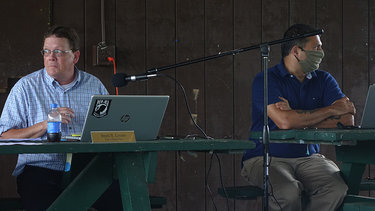Committee on Open Government says: Berne executive sessions illegitimate
BERNE — The Berne Town Board is wrong to call for executive sessions on the grounds of discussing “personnel matters” — as it has done at least twice this year and five times in 2019 — according to New York State’s Committee on Open Government.
“While for some it may be a matter of semantics,” Executive Director Shoshanah Bewlay told The Enterprise, “you are correct that the [Open Meetings Law] requires that the public body describe the content of the Executive Session with specific reference to one of the stated enumerated proper topics for such session, and the words ‘personnel matters’ do not appear in the statute.”
This is in contrast with the advice given to the board at its April 29 meeting by its new counsel, Javid Afzali, a lawyer who works for Bond Schoeneck & King. After William Conboy III resigned as Berne’s attorney, the board in April chose the firm, which appointed Afzali as lead counsel.
Afzali on April 29 was responding to Councilman Joel Willsey, who said that the board lied about discussing “personnel matters” to enter into an executive session that he said was spent criticizing him.
“If we are going to go into executive session to discuss actions we want to take against an elected official,” Willsey said at the meeting, “I don’t think the reason should be to discuss personnel matters. I think it’s disingenuous to say that.”
“Under the Open Meetings Law,” Afzali said, “a permissible reason to go into executive session is to discuss personnel matters, which includes disciplinary matters. Elected officials are certainly subject to discipline.”
Afzali further explained that, because elected officials are able to be disciplined by the board, they are eligible to be the subject of an executive session. In her opinion, Bewlay agreed with Afzali’s argument.
“There does not appear to be a requirement that the particular person be an employee of the agency for which the public body is acting,” Bewlay said.
Willsey revived his argument in a letter to the Enterprise editor published in the Aug. 13 edition, and alleged that Afzali challenged Willsey to bring the issue of whether “personnel matter” is, on its own, sufficient justification for an executive session to court.
Political?
Willsey further alleged that Afzali is working on behalf of the town GOP rather than the town as a whole.
“In my opinion,” Willsey wrote, “based on my experience with the new town attorney, it appears he is representing the best interests of the Berne GOP organization at taxpayers’ expense. It appears the GOP found a lawyer who would make its political goals his priority.
“They also, in my opinion, found someone who would publicly misinform Berne residents to set up an ‘executive session’ situation under false pretenses where I could, yet again, be harassed and intimidated behind closed doors.”
Afzali declined to comment on Willsey’s allegations, instead deferring to Supervisor Sean Lyons.
In an email to The Enterprise this week, which is printed in its entirety as a letter to the Enterprise editor in the Aug. 13 edition, Lyons wrote that Willsey’s accusation that Afzali is working for the GOP board majority is “ridiculous.” He says, “And, just in case Mr. Willsey forgets, there is no GOP majority on the Berne Town Board. We have two Republicans, one Democrat, one Conservative, and one Independence Party member — I don’t know how much more politically diverse the town board can get.”
Lyons and Palow are enrolled Republicans. Bonnie Conklin, a Conservative, and Mathew Harris, an Independence Party member, received most of their votes last November from Republicans; both were endorsed by the Berne GOP committee headed by Randy Bashwinger.
At a public hearing on April 29, which was held as a video conference, Afzali controlled the flow of comments, presumably because he had the technical expertise. The hearing was on a proposed local law to expand the Berne Planning Board from five to seven members — an initiative the board ultimately scrapped after intense public opposition.
Kevin Crosier, Berne’s former supervisor, a Democrat, was speaking during the remote hearing about why he thought expanding the board to allow for the appointment of Thomas Spargo was wrong. “What does Mr. Spargo bring to the table?” he asked.
“I would ask that you limit your comments to the local law,” said Afzali, to which Crosier retorted that Afzali was the town attorney, not the supervisor, and couldn’t silence him. Afzali said he could.
“I have the right to say whatever I want at a public hearing,” Crosier went on, calling the proposed board expansion a political game. Conklin called Crosier a disgusting ex-supervisor after Crosier commented on her rolling her eyes.
After muting Crosier, Afzali then muted everyone, saying the public hearing had devolved into public disparagement.
Willsey’s distrust of Afzali and the board culminated in his refusal to enter into an executive session at the town board’s July 22 meeting after Councilman Harris called for a closed-door session to discuss the town highway employee contract.
Afzali could be seen speaking with Willsey at the dais, and it was then that Willsey and Afzali allegedly debated whether or not “personnel matters” was a legitimate reason to go into executive session, although that had not been the given reason for that particular session.
“The attorney assured me he would be there to be sure nothing inappropriate happened,” Willsey wrote in his letter to the Enterprise editor. “I advised him that I did not trust him any more than the board members.”
Although Afzali declined to comment, Lyons defended the attorney’s objectivity.
“Mr. Willsey’s statements about the town attorney as being representative of the town GOP rather than a professional serving the town is a classic ad hominem attack of which Mr. Willsey should be deeply ashamed,” Lyons wrote.
“Personnel matters”
Lyons also wrote, “I have gone to great lengths to ensure executive sessions have been called in accordance with Public Officers Law. Unfortunately, Mr. Willsey often confuses his feelings for facts, and any fact that hurts his feelings or is different then his opinion, he takes as a direct attack on him. This is ironic because most often he is the one leading the attacks on his perceived personal enemies.”
Lyons went on to encourage those curious about the issue to hear Afzali’s explanation of the validity of “personnel matters” and the executive sessions on that basis.
“As a result [of those executive sessions], disciplinary action was ultimately taken against the subject of that executive session when the town board publicly censured Mr. Willsey for shameful and morally corrupt behavior detailed in the censure resolution that you are free to publish.”
Although Berne was wrong to enter into executive session on April 22 and April 29 with only “personnel matters” as the reason, and Afzali was wrong to argue that it was, the practice is not uncommon, as “personnel matters” had been carried out five times in Berne alone in 2019, when it was under the guidance of Conboy.
In 2019, the Berne Town Board entered into eight executive sessions, and only three were appropriately announced. On Jan. 9 and Dec. 11, the executive sessions were held for discussions on employment history, and on March 13, one was held to discuss litigation.
The law
The state’s Open Meetings Law lists eight reasons that an elected board may go into executive session. A board is not required to go into a closed-door meeting for these reasons but may vote to do so beforehand.
The reasons include matters that will imperil public safety that will disclose the identity of a law-enforcement agent; that would imperil law enforcement involved in investigating or prosecuting a criminal offense; that involves litigation; that involves collective bargaining; that involves the preparation, grading, or administration of exams; or that involves the proposed acquisition, sale, or lease of property or securities when publicity could affect value.
The reason that the Berne board presumably went into executive session was to discuss “the medical, financial, credit or employment history of a particular person or corporation, or matters leading to the appointment, employment, promotion, demotion, discipline, suspension, dismissal or removal of a particular person or corporation.”
On the consequences of an inappropriately held executive session, Bewlay said that that determination is up to New York courts.
She quoted Section 107 of Open Meetings Law, which states, “Any aggrieved person shall have standing to enforce the provisions of this article against a public body by the commencement of a proceeding pursuant to article seventy-eight of the civil practice law and rules, or an action for declaratory judgment and injunctive relief.
“In any such action or proceeding,” the law says, “if a court determines that a public body failed to comply with this article, the court shall have the power, in its discretion, upon good cause shown, to declare that the public body violated this article and/or declare the action taken in relation to such violation void, in whole or in part, without prejudice to reconsideration in compliance with this article.
“If the court determines that a public body has violated this article, the court may require the members of the public body to participate in a training session concerning the obligations imposed by this article conducted by the staff of the committee on open government. An unintentional failure to fully comply with the notice provisions required by this article shall not alone be grounds for invalidating any action taken at a meeting of a public body.”



